Thomas Campbell (poet)
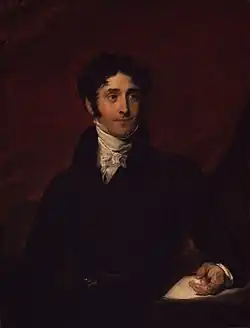
The power of grace, the magic of a name?
Thomas Campbell (July 27, 1777 – June 15, 1844) was a Scottish poet, who served as Lord Rector of Glasgow University (1826–1829).
Quotes
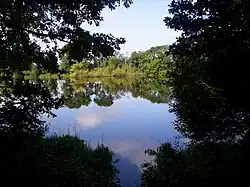
No blithe Irish lad was so happy as I.
- On the green banks of Shannon, when Sheelah was nigh,
No blithe Irish lad was so happy as I;
No harp like my own could so cheerily play,
And wherever I went was my poor dog Tray.- The Harper, st. 1 (1799)
- To bear is to conquer our fate.
- On visiting a Scene in Argyleshire, st. 4 (c. 1801)
- Lochiel, Lochiel, beware of the day!
For, dark and despairing, my sight I may seal,
But man cannot cover what God would reveal:
'Tis the sunset of life gives me mystical lore,
And coming events cast their shadows before.- Lochiel's Warning (1802); a poem about "Gentle Lochiel", Donald Cameron of Lochiel, and the final defeat of his forces and other Jacobites at the Battle of Culloden, in which he was badly wounded
- Shall victor exult, or in death be laid low,
With his back to the field and his feet to the foe,
And leaving in battle no blot on his name,
Look proudly to heaven from the death-bed of fame.- Lochiel's Warning (1802)
- The combat deepens. On, ye brave,
Who rush to glory or the grave!
Wave, Munich! all thy banners wave,
And charge with all thy chivalry!- Hohenlinden, st. 7 (1802)
- Few, few shall part where many meet!
The snow shall be their winding-sheet,
And every turf beneath their feet
Shall be a soldier's sepulchre.- Hohenlinden, st. 8 (1802)
- There was silence deep as death,
And the boldest held his breath,
For a time.- Battle of the Baltic, st. 2 (1805); about the Battle of Copenhagen
- Ye are brothers! ye are men!
And we conquer but to save.- Battle of the Baltic, st. 5 (1805)
- Let us think of them that sleep,
Full many a fathom deep,
By thy wild and stormy steep,
Elsinore!- Battle of the Baltic, st. 7 (1805)
- Oh leave this barren spot to me!
Spare, woodman, spare the beechen tree!- The Beech Tree's Petition, st. 1 (1803)
- Oh! once the harp of Innisfail
Was strung full high to notes of gladness;
But yet it often told a tale
Of more prevailing sadness.- O'Connor's Child, st. 1 (1810)
- The hunter and the deer a shade.
- O'Connor's Child, st. 5 (1810)
- Another's sword has laid him low,
Another's and another's;
And every hand that dealt the blow—
Ah me! it was a brother's!- O'Connor's Child, st. 10 (1810)
- Our bugles sang truce, for the night-cloud had lower'd,
And the sentinel stars set their watch in the sky;
And thousands had sunk on the ground overpower'd,
The weary to sleep, and the wounded to die.- The Soldier's Dream, st. 1
- In life's morning march, when my bosom was young.
- The Soldier's Dream, st. 4
- But sorrow return'd with the dawning of morn,
And the voice in my dreaming ear melted away.- The Soldier's Dream, st. 6
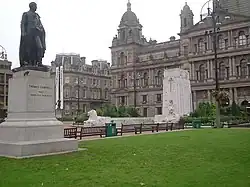
Is not to die.
- To live in hearts we leave behind
Is not to die.- Hallowed Ground, st. 6 (1825)
- And rustic life and poverty
Grow beautiful beneath his touch.- Ode to the Memory of Burns, st. 5
- Whose lines are mottoes of the heart,
Whose truths electrify the sage.- Ode to the Memory of Burns, st. 14
- There came to the beach a poor exile of Erin,
The dew on his thin robe was heavy and chill;
For his country he sigh'd, when at twilight repairing
To wander alone by the wind-beaten hill.- The Exile of Erin, st. 1
- Better be courted and jilted
Than never be courted at all.- The Jilted Nymph (1843)
- An original something, fair maid, you would win me
To write — but how shall I begin?
For I fear I have nothing original in me —
Excepting Original Sin.- To a Young Lady, Who Asked Me to Write Something Original for Her Album (1843)
- Now Barabbas was a publisher.
- Attributed, in Samuel Smiles, A Publisher and his Friends: Memoir and Correspondence of the late John Murray (1891) vol. 1, ch. 14; also attributed to Lord Byron: see Notes and Queries, 11th ser., vol. 2 (30 July 1910) p. 92
- A chieftain to the Highlands bound
Cries, "Boatman, do not tarry!
And I'll give thee a silver pound
To row us o'er the ferry!"- Stanza 1
- "Now who be ye would cross Lochgyle,
This dark and stormy water?"
"O I'm the chief of Ulva's isle,
And this, Lord Ullin's daughter.- Stanza 2
- "Come back! come back!" he cried in grief
"Across this stormy water;
And I'll forgive your Highland chief,
My daughter! O my daughter!"- Stanza 13
The Pleasures of Hope (1799)
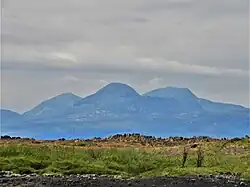
And robes the mountain in its azure hue.
- 'Tis distance lends enchantment to the view,
And robes the mountain in its azure hue.- Part I, line 7
- What potent spirit guides the raptur'd eye
To pierce the shades of dim futurity?
Can Wisdom lend, with all her heav'nly pow'r,
The pledge of Joy's anticipated hour? Ah, no! she darkly sees the fate of man—
Her dim horizon bounded to a span;
Or, if she hold an image to the view,
Tis nature pictur'd too severely true.- Part I, lines 14-21
- With thee, sweet Hope! resides the heav'nly light,
That pours remotest rapture on the sight:
Thine is the charm of life's bewilder'd way,
That calls each slumb'ring passion into play.- Part I, lines 22-25
- When peace and mercy, banish'd from the plain,
Sprung on the viewless winds to Heav'n again;
All, all forsook the friendless guilty mind,
But Hope, the charmer, linger'd still behind.- Part I, lines 37-40
- Thus, while Elijah's burning wheels prepare,
From Carmel's height, to sweep the fields of air,
The prophet's mantle, ere his flight began,
Dropt on the world — a sacred gift to man.- Part I, lines 41-44
.jpg)
Earth's loneliest bounds, and Ocean's wildest shore.
- Auspicious Hope! in thy sweet garden grow
Wreaths for each toil, a charm for every woe:
Won by their sweets, in nature's languid hour,
The way-worn pilgrim seeks thy summer bower; There, as the wild bee murmurs on the wing,
What peaceful dreams thy handmaid spirits bring!
What viewless forms th' Æolian organ play,
And sweep the furrow'd lines of anxious thought away! Angel of life! thy glittering wings explore
Earth's loneliest bounds, and Ocean's wildest shore.- Part I, lines 45-54
- O Heaven! he cried, my bleeding country save!
- Part I, line 359
- Hope, for a season, bade the world farewell,
And Freedom shrieked—as Kosciusko fell!- Part I, line 381
- On Prague's proud arch the fires of ruin glow,
His blood-dyed waters murmuring far below.- Part I, line 385
- And rival all but Shakespeare's name below.
- Part I, line 472
- Who hath not owned, with rapture-smitten frame,
The power of grace, the magic of a name?- Part II, line 5
- Without the smile from partial beauty won,
Oh what were man? — a world without a sun.- Part II, line 21
- The world was sad, the garden was a wild,
And man the hermit sigh'd — till woman smiled.- Part II, line 37
- While Memory watches o'er the sad review
Of joys that faded like the morning dew.- Part II, line 45
- There shall he love when genial morn appears,
Like pensive Beauty smiling in her tears.- Part II, line 95
- Let Winter come! let polar spirits sweep
The darkening world, and tempest-troubled deep!
Though boundless snows the withered heath deform,
And the dim sun scarce wanders through the storm,
Yet shall the smile of social love repay,
With mental light, the melancholy day!
And, when its short and sullen noon is o'er,
The ice-chained waters slumbering on the shore,
How bright the fagots in his little hall
Blaze on the hearth, and warm the pictured wall!- Part II, line 115–124
- What millions died that Caesar might be great!
- Part II, line 174
- That gems the starry girdle of the year.
- Part II, line 194
But leave, oh! leave the light of Hope behind!
- Melt and dispel, ye spectre-doubts, that roll
Cimmerian darkness o'er the parting soul!- Part II, line 263
- O star-eyed Science! hast thou wandered there,
To waft us home the message of despair?- Part II, line 325
- But sad as angels for the good man's sin,
Weep to record, and blush to give it in.- Part II, line 357
- Cease, every joy, to glimmer on my mind,
But leave, oh! leave the light of Hope behind!- Part II, line 373
- What though my wingèd hours of bliss have been
Like angels visits, few and far between.- Part II, line 375
Ye Mariners of England (1800)
- Ye mariners of England,
That guard our native seas;
Whose flag has braved, a thousand years,
The battle and the breeze!- Stanza 1
- While the battle rages loud and long,
And the stormy winds do blow.- Stanza 1
- Britannia needs no bulwarks,
No towers along the steep;
Her march is o'er the mountain waves,
Her home is on the deep.- Stanza 3
- With thunders from her native oak,
She quells the floods below.- Stanza 3
- The meteor flag of England
Shall yet terrific burn,
Till danger's troubled night depart,
And the star of peace return.- Stanza 4
Gertrude of Wyoming (1809)
- A stoic of the woods—a man without a tear.
- Part I, stanza 23 (1809)
- O Love! in such a wilderness as this.
- Part III, stanza 1
- The torrent's smoothness, ere it dash below!
- Part III, stanza 5
- To-morrow let us do or die.
- Part III, stanza 37
Theodric: A Domestic Tale; and Other Poems (1825)
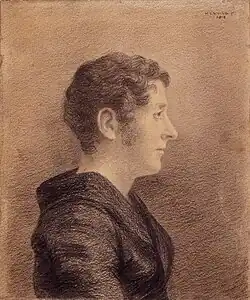
The one just suited to our mind!
- Oh, how hard it is to find
The one just suited to our mind!- Song ("Oh, how hard it is to find"), st. 1
- Drink ye to her that each loves best!
And if you nurse a flame
That's told but to her mutual breast,
We will not ask her name.- Song ("Drink ye to Her"), st. 1
- Again to the battle, Achaians!
Our hearts bid the tyrants defiance!
Our land, the first garden of Liberty's tree,
It has been, and shall yet be, the land of the free.- Song of the Greeks, st. 1
- Star that bringest home the bee,
And sett'st the weary labourer free!- Song to the Evening Star, st. 1
- Absence! is not the soul torn by it
From more than light, or life, or breath?
'Tis Lethe's gloom, but not its quiet,—
The pain without the peace of death!- Absence, st. 4
- All worldly shapes shall melt in gloom,
The Sun himself must die,
Before this mortal shall assume
Its Immortality!- The Last Man, st. 1
- I saw the last of human mould,
That shall Creation's death behold,
As Adam saw her prime!- The Last Man, st. 1
- Roland, the flower of Chivalry,
Expired at Roncevall.- Roland the Brave, st. 7

When storms prepare to part,
I ask not proud Philosophy
To teach me what thou art.

A midway station given,
For happy spirits to alight,
Betwixt the earth and heaven.
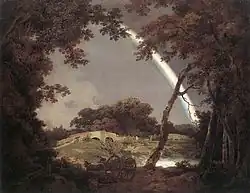
But words of the Most High,
Have told why first thy robe of beams
Was woven in the sky.
- Triumphal arch, that fill'st the sky
When storms prepare to part,
I ask not proud Philosophy
To teach me what thou art. — Still seem, as to my childhood's sight,
A midway station given,
For happy spirits to alight,
Betwixt the earth and heaven.- Sts. 1 and 2
- Can all that optics teach, unfold
Thy form to please me so,
As when I dreamt of gems and gold
Hid in thy radiant bow? When Science from Creation's face
Enchantment's veil withdraws,
What lovely visions yield their place
To cold material laws! And yet, fair bow, no fabling dreams,
But words of the Most High,
Have told why first thy robe of beams
Was woven in the sky.- Sts. 3, 4 and 5
- When o'er the green undeluged earth
Heaven's covenant thou didst shine,
How came the world's grey fathers forth
To watch thy sacred sign. And when its yellow lustre smiled
O'er mountains yet untrod,
Each mother held aloft her child
To bless the bow of God.- Sts. 6 and 7
- Methinks, thy jubilee to keep,
The first-made anthem rang
On earth deliver'd from the deep,
And the first poet sang. Nor ever shall the Muse's eye
Unraptured greet thy beam:
Theme of primeval prophecy,
Be still the poet's theme!- Sts. 8 and 9
- How glorious is thy girdle cast
O'er mountain, tower, and town,
Or mirror'd in the ocean vast,
A thousand fathoms down! As fresh in yon horizon dark,
As young thy beauties seem,
As when the eagle from the ark
First sported in thy beam. For, faithful to its sacred page,
Heaven still rebuilds thy span,
Nor lets the type grow pale with age
That first spoke peace to man.- Sts. 11, 12 and 13
Translations
- How glorious fall the valiant, sword in hand,
In front of battle for their native land!- Martial Elegy (from Tyrtaeus, frag. 10)
- But youth’s fair form, though fallen, is ever fair,
And beautiful in death the boy appears,
The hero boy, that dies in blooming years:
In man’s regret he lives, and woman’s tears;
More sacred than in life, and lovelier far,
For having perished in the front of war.- Martial Elegy (from Tyrtaeus, frag. 10)
- But your wights that take no pride to wield
A massy spear and well-made shield,
Nor joy to draw the sword:
Oh, I bring those heartless, hapless drones,
Down in a trice on their marrow-bones,
To call me King and Lord.- Song (from Hybrias the Cretan)
Quotes about Campbell
- Mr. Campbell may be said to hold a place (among modern poets) between Lord Byron and Mr. Rogers. With much of the glossy splendour, the pointed vigour, and romantic interest of the one, he possesses the fastidious refinement, the classic elegance of the other. … There are those who complain of the little that Mr. Campbell has done in poetry, and who seem to insinuate that he is deterred by his own reputation from making any further or higher attempts. But after having produced two poems that have gone to the heart of a nation, and are gifts to a world, he may surely linger out the rest of his life in a dream of immortality.
- William Hazlitt, The Spirit of the Age (1825) "Mr. Campbell and Mr. Crabbe"